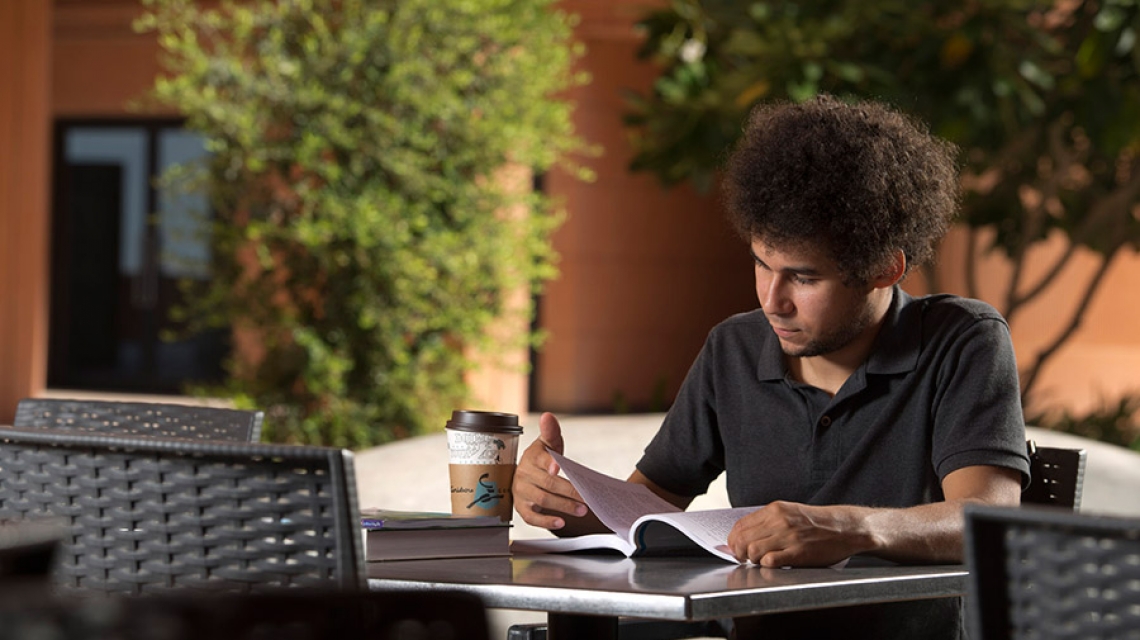
The inaugural group of graduates from the Sustainable Critical Infrastructure (SCI) program from Masdar Institute of Science and Technology are gearing up to take on challenges in urban planning and development.
The SCI students received their Master of Science degrees on 24 May at the Commencement ceremony for Class of 2016. These graduates are expected to contribute their expertise to the rapidly developing sustainable development and green construction sector, regionally and globally.
Dr. Steve Griffiths, Vice President for Research, Masdar Institute, said: “The inaugural group of graduates in Sustainable Critical Infrastructure reflects the strength of our academic expertise in developing skillsets required for meeting key challenges in resource efficiency for Abu Dhabi and the region. With their newly acquired knowledge, we believe these graduates will make a difference in resource efficient urban planning and infrastructure design, locally and globally, advancing Masdar Institute’s mission to support sustainability.”
“As Master’s students, this inaugural batch was provided with the training and guidance needed to tackle challenges in realizing a fully sustainable infrastructure sector; mainly, in the efficiently-built environment, smart and connected transport network, and sustainable urban planning, which are the main themes of the SCI program. As professionals, their abilities will be further tested in urban planning, green construction and infrastructure development, but I am confident that they will rise to the occasion and help enhance the UAE’s position as an innovative sustainable developer,” said Dr Mohamed Atif Omar, Professor of Engineering Systems and Management, Masdar Institute.
“Our SCI program pioneers have dedicated their thesis research to addressing some of the unique challenges that regional developers face in achieving effective, affordable and sustainable urban projects. We are proud that our SCI graduates have advanced the cutting edge of sustainable infrastructure research from energy-efficient buildings to smart transportation planning in the Gulf and believe their work as professionals after graduation will continue to help the UAE and its neighbors achieve their shared sustainable development goals,” Dr Omar added.
UAE National Anfal Al-Ali has focused her thesis research on the topic of enhancing the social capital of open space in Abu Dhabi.
She explained: “As a researcher in urban planning, I realized that some neighborhoods may look as if they are ideally designed when we examine them from a distance, but when you examine them closely, you can see that for some reason, these neighborhoods act like boundaries between residents. My research investigated the problems that prevent sociability at the neighborhood scale.”
Al-Ali is now looking forward to contributing his knowledge to sectors including architecture, design, urban planning, and project management.
Aleksandar Abu Samra from Serbia, whose thesis is titled “Public Data for Energy and Environment Research in UAE,” spent his time at Masdar Institute exploring the current state of information-sharing about infrastructure in the UAE and proposes solutions for its improvement. He believes it can help the UAE and countries of the region in adapting relevant international trends to their local needs.
Winner of the ‘Best Embodiment of Values and Ethics’ prize at Al Jazeera’s ‘Canvas’ hackathon in 2014, Abu Samra said: “I look forward to innovative and inclusive solutions for helping societies develop the sustainable critical infrastructure sector. I hope to be able to avoid issues of the currently underdeveloped infrastructure market in my country and seek solutions for improvement.”
Fellow SCI student Jiin Baek from South Korea has focused her thesis research on “How the Built Environment and Individuals Perceptions Affect Walking Patterns: The Case of Abu Dhabi Downtown”.
Explaining the potential impact of her research Baek said: “My observation on people’s walking pattern, purpose of walking, and their perception of walking in Abu Dhabi has given me good understanding of the emirate’s infrastructure. I would love to work for the government sector in the UAE, such as the Urban Planning Council or Abu Dhabi Municipality to implement my knowledge and experience, or as an urban designer with critical thinking of sustainable development for a consultancy firm. I also hope to continue and expand on the sustainable lifestyle habits I developed at Masdar Institute, like recycling, walking, and energy-saving. As a designer and researcher, I believe it is important to emphasize the role of active design and movement in social community.”
Another student Victoria Hernandez Streiedinger’s thesis is titled “Assessing and planning for walkability using mix methods approach: Abu Dhabi – a case study.” Streiedinger hails from Mexico.
Revealing her motivation, she said: “As the world’s population continues to increase, the migration of people from suburbs to cities progresses, and climate change becomes an ever-present issue. In this situation, sustainable critical infrastructure elements such as walkability will become the foundation of all future cities, out of necessity to provide future generations with livable cities.”
Streiedinger believes the planning of healthier walkable environments could be one of the top priorities for Abu Dhabi’s Urban Planning Council. The government’s involvement for sustainable transportation has the potential to encourage a broader audience, and to show that improvements are attainable, she added.
The SCI program is delivered through a faculty cohort that include experts in urban planning such as Dr. Khaled Al Awadi, Assistant Professor, and Dr. Praveen Maghelal, Associate Professor, and experts in efficient buildings science such as Dr. Afshin Afshari, Professor of Practice, and Dr.Elie Azar, Assistant Professor, as well as experts in travel behavior and transport planning such as Dr. P. Zhu, Assistant professor, and Dr. Abdullah Galadari, Assistant Professor. Dr. Al Awadi served as the leading founding member to the SCI program and received the Institute Best Service Award last year for his dedication and role as the Principle Founding Member of the Program.
Masdar Institute’s SCI program aims to develop future leaders with the ability to design integrated urban infrastructure systems for new or existing developments after careful examination of environmental, social and financial requirements. The program was established in 2014 in response to important role the built environment plays in managing sustainable consumption of resources.
Clarence Michael
News Writer
25 May 2016